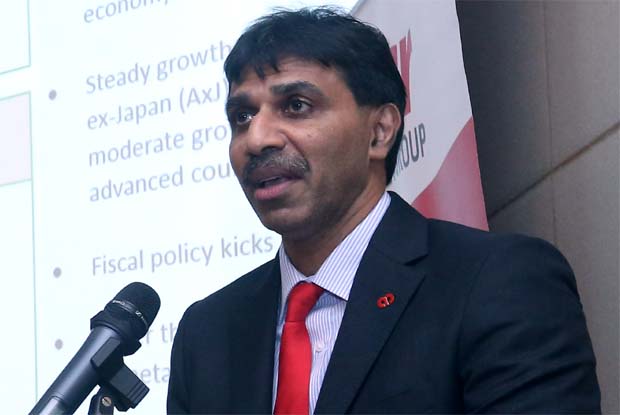Worrying trend of private investments in Malaysia
PETALING JAYA: Against a backdrop of recessionary risk looming in Asia, the declining private investment scene in Malaysia is stoking concerns and economists believe it needs urgent address.
While economists are maintaining their economic growth projections for the upcoming quarters, they agree that private investment needs to be seriously looked at to ensure the nation’s gross domestic product (GDP) growth is not derailed.
The ongoing US-China trade war and geo-political risk is not making it any easier for Asia as governments look at various economic tools to combat slowing economic growth.
AmBank Group chief economist Anthony Dass(pic), who is projecting a 4.5% GDP growth this year for Malaysia, said the economic growth hinges largely on domestic demand and private investment.
To this end, he told StarBiz it is imperative for the government to arrest the alarming decline in private-sector investments which has slid from 6.9% in the third quarter of last year (3Q18) to 0.4% in 1Q19.
“Business are holding back in reinvesting or new investments. Sentiments on the ground seem to be trending towards caution. Caution among investors is due to the lack of policy clarity and uncertainties on the external front,” he said.
He said the sliding private investment trend is a concern and needs policy attention as private investments are essential to boosting growth and creating jobs.
“Policies should focus on how we can improve our competitive edge, what kind of economic policies we should adopt, and for the short term, some quick fixes that we can look into to support growth,” he said.
Dass said though the trade tension may see higher investments from the United States and China flowing into Asean, including Malaysia, one should not be too excited with the 1Q19 approved foreign direct investment (FDI) figures. Approved FDI inflows in 1Q19 jumped by 73.4%.
He said this is due to an uncertain global outlook given a slower global trade and demand scenario.
Risk of unanticipated shocks remains high and could potentially drag global growth, he noted.
“Underpinned by uncertainties, it is likely to influence business investment decisions, though they may have been approved, implying risk of slower implementation or actual investment taking place,” Dass said.
Lee Heng Guie, who is the executive director of Socio-Economic Research Centre of the Associated Chinese Chambers of Commerce and Industry of Malaysia, said he was maintaining his GDP growth forecast of 4.5%-4.7% for the year.
Looking ahead, he said real GDP growth is expected to grow by between 4.6% and 4.7% in the remaining quarters as external environment is still impaired by the escalation of trade war.
However, Lee noted that private investment is a key theme to be watched as it has slowed drastically in recent quarters.
“The sharp pullback in private fixed capital spending is worrisome as private investment is critical for sustaining our economic growth on a sustained basis, raises productivity, creates high income jobs and increases exports,” Lee added.
Bank Islam Malaysia Bhd chief economist Mohd Afzanizam Abdul Rashid said private investment has been “lethargic” in line with the PMI Indices for Malaysia.
What it means is that companies are most likely reluctant to expand their productive capacity as outlook for final demand has been highly uncertain, he said.
“The country need a catalyst for growth. In this regard, the government needs to play an active role. Speeding up the execution of infra projects are definitely one of the key priorities.
“Not only will it boost confidence, especially players in the construction sector and related industries along the value chain, it will also improve the country’s production capacity in the long run,” he said.
Afzanizam added he was still maintaining his 2019 GDP growth projection at 4.5%. Private consumption is expected to be the main driver for growth albeit at slower pace compared to 2018, he said, noting that for 2Q19, he is tentatively looking at a 4.4% growth.
Dass said he was maintaining this year’s economic growth at 4.5% with the upside to growth at 4.7%, while the downside risk to growth is 4%.
Following a 4.5% year-on-year GDP growth in 1Q19, the outlook for 2Q19 based on some of the preliminary numbers such as PMI Manufacturing, industrial production and exports, it seems to suggest that the 2Q19 GDP should be in a decent range of between 4.5% and 5%, he said.
Meanwhile, Malaysian Rating Corp Bhd (MARC) associate director of economic research Nor Zahidi Alias noted that with trade tensions likely to persist throughout the year, there is a downside risk to the rating agency’s current real GDP growth forecast of 4.6% for 2019.
“Notwithstanding this, private expenditure will remain supportive of Malaysia’s headline growth this year. Consumer spending growth may taper off slightly, but it will remain at a respectable pace of around 6.4%.
“Hence, we still foresee Malaysia’s real GDP growth pace coming in above 4% this year. For 2Q19, we envisage growth pace to be within the 4%-4.5% range,” he said.
Going into 2020, Zahidi said he foresees possible fiscal support coming from the government despite its intention to continue consolidating expenditure.
He does not expect any downward revision in Malaysia’s sovereign credit rating, even if the government slightly misses its budget deficit target of 3% of GDP in 2020.
This is because given rising external uncertainties, things could get worse if there is no support for the economy, he said.
For 2019, Bank Negara is projecting the economy to grow between 4.3% and 4.8%. Last year, GDP increased by 4.7%.
Source: https://www.thestar.com.my/business/business-news/2019/07/29/worrying-trend-of-private-investments#mzTM167ryuXXrl8g.99


 Thailand
Thailand




